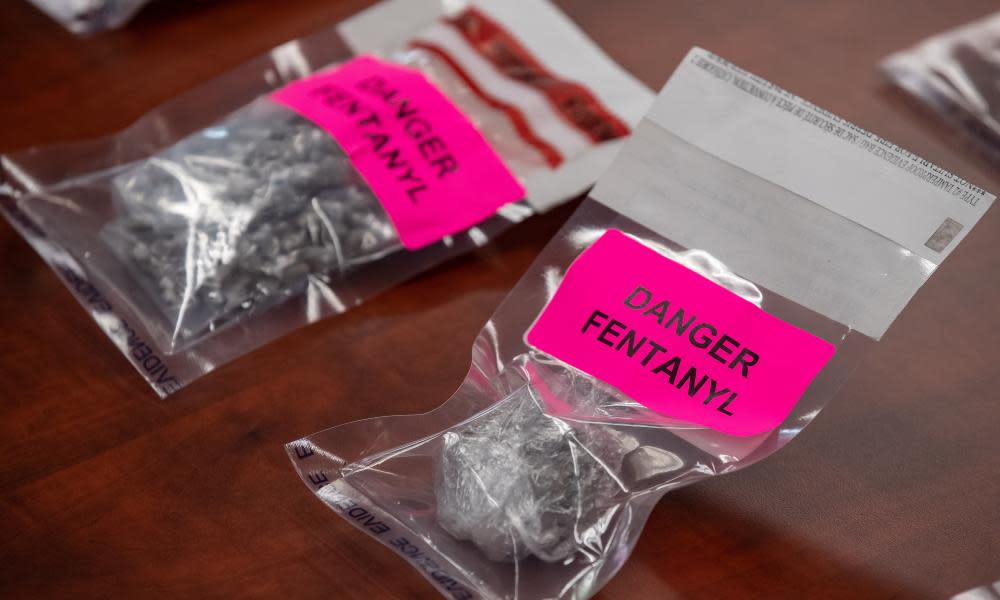British Columbia pioneers programme to offer safer alternatives to street drugs

In a North American first, Canada’s westernmost province has announced plans to provide more legal alternatives to street drugs like fentanyl for people at risk of an overdose, and will allow nurses to start prescribing them.
The new policies, announced on Wednesday, are aimed at providing greater access to pharmaceutical drugs like hydromorphone amid the worst spate of overdoses British Columbia has ever seen.
The expanded drugs will include the potential for smokable and injectable options. “We are breaking new ground here, no question about that,” said Judy Darcy, BC’s minister of mental health and addictions.
The moves constitutes a major expansion to “safer supply” prescribing guidelines, which aim to provide illicit drug users with an alternative to the increasingly toxic and contaminated street drug supply.
Related: 'So much sadness': more British Columbians dying from overdoses than Covid
So far this year, fatal overdoses have killed more than 900 people in British Columbia – more than four times the number who have died of Covid-19. Similar spikes in overdose deaths are being seen across the country. Since 2016 more than 15,000 people in Canada have died of illicit drug overdoses.
The policy changes bring a sweeping expansion to a program first rolled out in March as a means to help people who use drugs self-isolate during the Covid-19 pandemic.
One stumbling block for that programme was that many patients could not find a doctor willing to prescribe take-home opioids such as hydromorphone tablets, and some lived in communities that have no doctor.
“This will help ensure there is more equitable access so you don’t have to live in a city with an addictions clinic” in order to qualify, said Darcy.
Guy Felicella, a peer clinical adviser with the BC Centre on Substance Use, compared the expanded guidelines to the groundbreaking establishment of North America’s first supervised injection site in 2003. That model helped pave the way for harm reduction policies and overdose prevention sites that now exist in many jurisdictions across the continent.
Related: Canada offers places for addicts to shoot up safely. Can the US copy the model?
Marilou Gagnon, an associate professor at the University of Victoria’s school of nursing also praised the move, but cautioned that it must come with additional support for frontline nurses who already carry heavy burdens.
“I hope this will be implemented in a way that is supportive of the needs on the ground and not at the cost of registered nurses doing more without more resources,” she said.
In a statement, the government said exactly which drugs will be made available is currently under review, with final decisions expected as early as late October.
A July letter to Jordan Westfall, the head of the Canadian Association for a Safe Supply, the deputy health minister, Stephen Brown, said the government “is actively engaged in securing the option of injectable hydromorphone and a domestic supply of diacetylmorphine (the pharmaceutical name for prescription heroin)”.
One of the biggest hurdles with diacetylmorphine is that there is no easy way to get it in Canada. In 2019 the federal government added the drug to a list of substances that may be imported from other countries for clinical use, but doing so remains prohibitively expensive on a large scale.
Vancouver-based Fair Price Pharma is working to change that by making the drug locally under the brand name Opiax.
“The product we are trying to introduce – Opiax – would fit perfectly with this announcement,” said Fair Price Pharma’s president and CEO, Dr Martin Schechter.
“Now that nurses can prescribe, we have to get them something to prescribe,” Dr Schechter said. The company is fundraising now, and still needs regulatory approval from Health Canada, but if all goes according to plan Schechter estimates it could have a product ready for market within 18 months.
The new policies are likely to be controversial in some circles. The past few months have seen increasing frustration from some Vancouver community groups, including those who claim harm reduction strategies are making local crime worse. A recent anonymous flyer campaign urged the funding of “cops, not junkies”.

 Yahoo News
Yahoo News 
